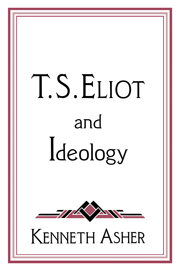2 - The French Connection
Published online by Cambridge University Press: 05 June 2012
Summary
Although he began addressing Babbitt as “Dear Master,” the recently graduated Eliot, in retracing his mentor's pilgrimage to Paris in 1910–11, seemed determined to put the older man's judgments to a rigorous test. Within a few months of his arrival he started attending regularly the lectures of Bergson, Babbitt's current bête noire, at the Collège de France. Bergson, in the aftermath of his most popular work, L'Évolution créatrice, was then enjoying the dizzying celebrity that only fashionable Paris can bestow on its intellectuals. But if Eliot came to mock, he stayed to worship; carried along on the general wave of enthusiasm in the packed hall – Bergson's popularity was such that he had to issue his own students reservations to ensure them a seat – he experienced a “temporary conversion.” We learn little from Eliot, then or later, about the precise nature of the philosopher's appeal, but he does confess that the infatuation lasted long enough for him to have written “The Love Song of J. Alfred Prufrock” as a Bergsonian, and a quick glance at this early poem confirms the assessment. Prufrock's social encounter places him right on the fault line of a rapidly moving chronological time and the slower, almost infinitely expandable, internal world of durée réelle. As Prufrock moves at Proustian speed in his private world, the clock has inexorably changed the hope of “There will be time” into the missed opportunity of “And would it have been worth it,” leaving him in frustrated impotence.
- Type
- Chapter
- Information
- T. S. Eliot and Ideology , pp. 35 - 59Publisher: Cambridge University PressPrint publication year: 1995



